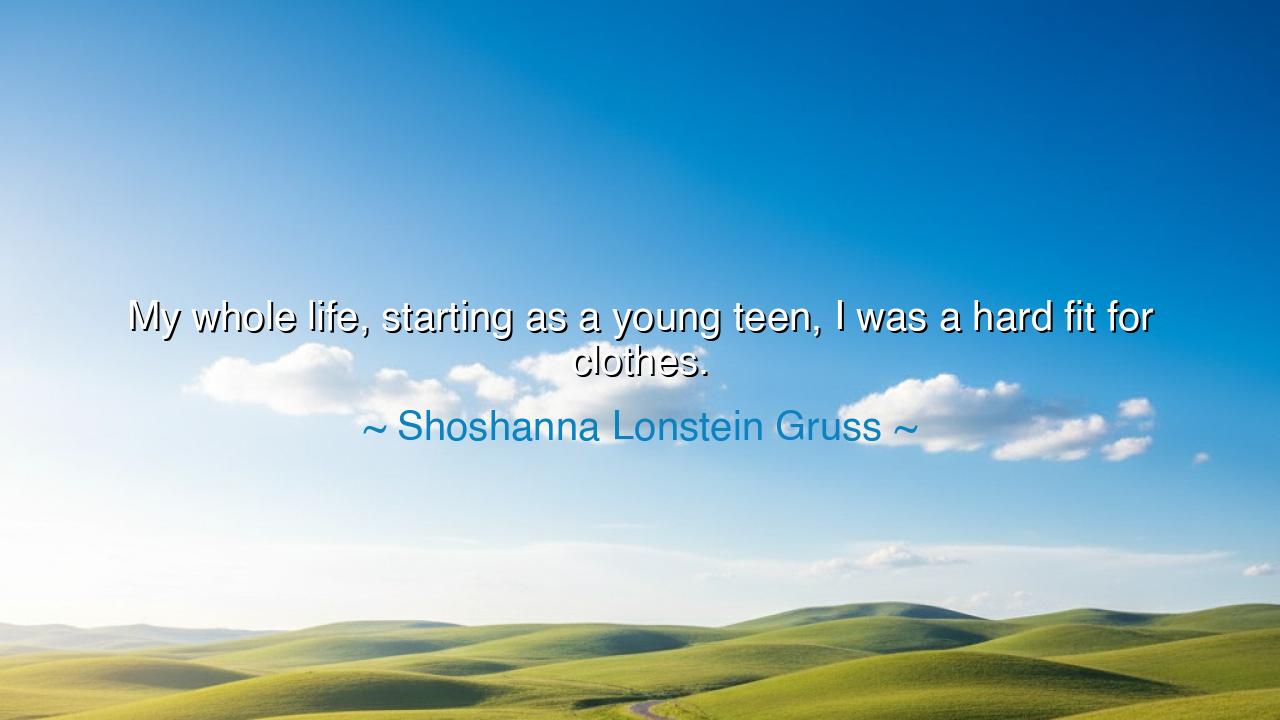
My whole life, starting as a young teen, I was a hard fit for






When Shoshanna Lonstein Gruss declared, “My whole life, starting as a young teen, I was a hard fit for clothes,” she spoke not merely of garments and fabric, but of the ancient struggle of the human spirit to find a dwelling place worthy of its form. For clothes are not only coverings of the body; they are symbols of identity, dignity, and belonging. To be a hard fit in a world of ready-made garments is to walk a road where the self resists being confined by common measure, where the inner essence outgrows the molds of society.
In the days of youth, when the body blossoms and changes, many find themselves wrestling with form and appearance. What Gruss faced in clothing was a mirror of what countless souls endure in spirit: the sense of being mismatched, of not finding where one belongs. It is a trial as old as time. Did not Socrates himself appear awkward to the eyes of Athens—short, plain, and ungainly—yet within him burned the fire of wisdom that could not be clothed in outward beauty? So too did Shoshanna find the world’s garments ill-suited, yet her dissonance would lead her toward creation, toward designing clothes that honored real bodies, real women, real lives.
Consider the tale of Joan of Arc, who refused to be clothed as the world expected of her. She cast aside the garments of maidenhood, donning armor instead, because the destiny written for her spirit did not fit the patterns of society. Though mocked, challenged, and condemned, she embodied the truth that to be a hard fit is not a curse but a sign: the vessel of the spirit demands a new form.
Thus, the origin of Gruss’s words lies not simply in youthful discomfort with fashion, but in the profound realization that the world often offers us coverings too small for the vastness of our being. What others see as inconvenience may in truth be the first whisper of calling—the call to craft new garments, new paths, new identities, to forge what did not exist before.
There is a lesson here for all generations: do not despise the feeling of being a hard fit. When you do not slip easily into the molds of the world, rejoice! For it means you are destined to carve a new mold, to weave a new garment, to live a story that cannot be mass-produced. The oak tree was once an acorn that burst apart its shell; the river was once a drop that refused to remain still. In this refusal lies greatness.
Practical action must follow wisdom. First, honor your form—whether body, mind, or spirit—without shame. If the garments of culture, expectation, or fashion do not fit, then let them go. Second, seek creators who celebrate difference, who make space for what is real rather than what is idealized. And third, become such a creator yourself. If the world’s offerings do not suit you, then rise and fashion offerings for others who feel the same dissonance. For in serving them, you heal both yourself and your community.
Above all, remember this: to be a hard fit for clothes is to be an emblem of humanity’s unyielding variety, its refusal to be bound by a single pattern. You are not an error; you are an exception. And exceptions are the sparks from which revolutions are born. Embrace your difference, and you may discover that the garments you create—whether of fabric, of words, or of deeds—will one day clothe the world itself.






AAdministratorAdministrator
Welcome, honored guests. Please leave a comment, we will respond soon